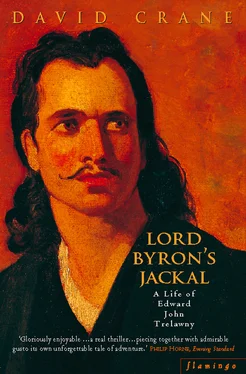

THE LIFE OF
Edward John Trelawny

DAVID CRANE

Cover
Title Page LORD BYRON’S JACKAL THE LIFE OF Edward John Trelawny DAVID CRANE
List of Maps LIST OF MAPS Greece 1823–1827 Major Francis D’Arcy Bacon’s Journey 1823–1825
Nauplia
1 The Wolf Cub
2 The Sun and the Glow-Worm
3 Et in Arcadia Ego
4 Odysseus
5 The Death of Byron
6 Parnassus
7 The Plot
8 Whitcombe
9 Assassination
10 Humphreys
11 Enter the Major
12 Shame
13 The Last of Greece
14 Going Public
15 The Keeper of the Flame
Notes to the Text
Reference Notes
Sources and Select Bibliography
Index
About the Author
Praise
Copyright
About the Publisher
Greece 1823–1827
Major Francis D’Arcy Bacon’s Journey 1823–1825
‘What a queer set! What an assemblage of romantic, adventurous, restless, crack-brained young men from the four corners of the world. How much courage and talent is to be found among them; but how much more of pompous vanity, of weak intellect, of mean selfishness, of utter depravity … Little have Philhellenes done towards raising the reputation of Europeans here!’
Samuel Gridley Howe 1
ON 6 FEBRUARY 1833 a seventeen-year-old Bavarian prince entered the town of Nauplia as the first king of Modern Greece. Out in the Gulf of Argos the ships of the sponsoring powers rode at anchor in the bright spring sunshine. French, Russian and British bands serenaded each other across the water in an improbable display of amity, while from the batteries on shore salute after salute rolled across the bay in tribute to Christendom’s youngest nation.
To the pragmatist and romantic alike there can have been no more fitting place for Otho to begin his reign than here on the Argolic Gulf under the watchful gaze of Europe’s navies and Greece’s Homeric past. Nothing, it seemed, had been left to chance to guarantee his future. The civilized world had given its blessing and its money. A loan had been provided to buttress his new country through her first years, an indemnity paid to her old Ottoman masters to rescue her from her troubled past.
Inside the town Bavarian and French troops stood ready to enforce Europe’s choice on a population only too accustomed to dissent, but for the moment the precautions were unnecessary. Mountain Suliotes and island merchants, sailors and Moreot bandits, Peloponnesian peasants and Phanariot politicians waited to greet the young king as their saviour from years of war and chaos. As Otho rode on his white horse through the cheering crowds into the reconquered Turkish town, the peculiar spell of Greece, its unique hold on the nineteenth century as the cradle of Western culture and the champion of Christianity, took on a palpable form that seemed in itself a guarantee of the new order.
For a dozen years this small town on the eastern coast of the Peloponnese, some forty miles south of Corinth, had exercised the same charm over the imaginations of Europe and America. From that moment in 1821 when Bishop Germanos had raised the standard of revolt and called on Greece to throw off four centuries of Ottoman rule Nauplia had been as familiar as any city in Europe. Its news was carried in newspapers from Vienna to Boston, its victories celebrated and its defeats mourned, its dead turned into martyrs, its leaders into the heirs of Demosthenes and Leonidas on a wave of popular enthusiasm which sent money and men to fight for a cause that seemed as much Christendom’s as Greece’s. ‘No other subject has ever excited such a powerful sensation,’ one enthusiast could write long after the first flush of excitement had faded,
The very peasants throughout Switzerland and Germany inquire with anxiety, when their affairs call them to market, what are the last news … In France subscriptions have been opened, and money solicited throughout every town, on behalf of a Christian Nation doomed to perish by the sword or by famine. The Duchesses of Albey, Broglio, and De Caze; every Frenchwoman distinguished by rank, riches, talent, or virtue, have divided the different quarters of Paris among them, and traverse on foot every street, and enter into every house, demanding the charity of their inhabitants for a nation of martyrs. 2
Almost every foreign volunteer swept along by this enthusiasm had passed through the town of Nauplia, many of them to stay for ever, victims of the squalor, disease and factional greed which lay behind the ceremonial glamour of Otho’s welcome. Italians, Swiss, Swedes, Scots, Irish and Poles had all come here, national rivalries if not forgotten at least subsumed into a common cause, Germans and French who had fought on opposite sides in the Napoleonic Wars, Americans and English enemies at New Orleans united under the name of ‘Philhellene’ – friend of Modern Greece, a Greece which Nauplia promised was the true heir to the land of Homer and Thucydides.
The ceremonial entry of Otho was the last great charade in Nauplia’s history, the last time that the town would work its illusions on a Europe determined to believe. That place is gone, the walls of its lower town pulled down, the surrounding marshes which once earned its pestilential reputation as the Batavia of Greece drained. Within a year of coming ashore from a British frigate, Otho had moved his capital to Athens and the port that the Venetians had called Napoli di Romania had begun its slow decline into the quaint irrelevance of modern Nauplia.
If you wander now among its steep, narrow streets, or along the waterfront with its view across to the jewel-like island fortress where nineteenth-century Nauplia, with its instinctive dislike for reality, housed its public executioner, there can seem nowhere in Greece that retains so much of its architecture and so little of its history. There is an elegance about even its fortifications that belies their past, that touch of unreality which is Venice’s supreme gift to her former possessions. Towards evening, especially, as the sun sinks behind the central mass of the Peloponnese, and the lines of Lassalle’s Palamidi citadel almost dissolve into the rock face, it is difficult to believe anything ever disturbed the town’s peace. Down in the harbour, near an obelisk commemorating French soldiers, a Hotel Grand Bretagne throws off a confused echo of the excitement of 1824 when a ship carrying English gold made Nauplia a sink for every patriot, idealist, charlatan and scrounger in Greece. In the centre of the old town, where the starving Turkish population once held out for a whole year, their mosque has been turned with an insolence too complete to be accident into a cinema. A little higher up the slope, a bullet mark still pocks the wall where Greece’s first president was assassinated. And in that bullet hole, carefully preserved behind glass, we have the quintessential Nauplia-history in aspic, sanitised and mythologized, history reduced to civic statuary and street names, the narrow alleys once notorious for their filth sunk now beneath nothing more oppressive than bougainvillaea, the extravagance, rivalries and violence of its brief years of fame no more intrusive than the wrecks of warships that lie submerged beneath the waters of the gulf.
Читать дальше
















